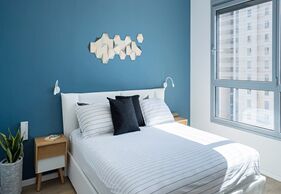睡眠专家建议卧室墙壁应涂成蓝色
|
It may be the decor colour of the moment but painting your bedroom wall the same shade as a bleak English sky could actually stop you from getting your eight hours' in. Grey is one of the colours that you should blacklist when thinking of re-painting your bedroom, according to a sleep expert at mattress company Sealy. However, blue could actually promote sleep because it sends calming messages to the brain. And while you might sleep in the dark, creeping light from streetlamps, and clutter from an untidy room could all add up to a night of insomnia.
Grey isn't the only colour you should avoid if you're reaching for a paintbrush. Reds, browns and purples can all hinder a peaceful night's sleep, says Sealy's sleep expert Natalie Armstrong. She told Femail: 'While your room is dark when you go to sleep, many of us spend an hour or more in our bedrooms with the light on before going to sleep, which is when the colour of your bedroom can be so disruptive. 'Colours that are too bright can put your brain into a state of high alert, which can last long after you've turned the light off and can no longer see the colour. 'Grey, while gentle, is also quite suppressive. The absence of any strong colour has a depressive effect on the brain because it is a colour typically used to represent sadness and dreariness. While the current trend for grey is trying to change this, the deep rooted associations of grey as a drab colour can make it a bad choice for bedroom décor.' The real colour champion when it comes to good sleep is blue, which is easily picked up by ganglion cells in the retinas of your eyes. The cells then send a message direct to your brain that you're in a calm environment. Another well-documented enemy of sleep includes smartphones but it isn't just your mobile that can stand in the way of sweet dreams. Reading a book on a Kindle or watching your favourite television show while tucked up in bed exposes you to exactly the same kind of 'blue' light. Says Armstrong: 'These devices emit the same blue light as phones, which has been shown to suppress melatonin, the sleep hormone, and disturb the body's natural circadian rhythms, which regulates our sleep-wake cycle.' Black-out blinds and heavy curtains can be the difference between a peaceful night's kip and tossing and turning, with lights from streetlamps outside a trigger to keep your brain activated. And while the phrase 'tidy house, tidy mind' might be ordinarily used in the daytime, it can be just as pertinent at night-time. If you're trying to sleep in a room that's heavy on clutter, you can carry that unsettled feeling into your subconscious when trying to fall into slumber, says Armstrong. |









